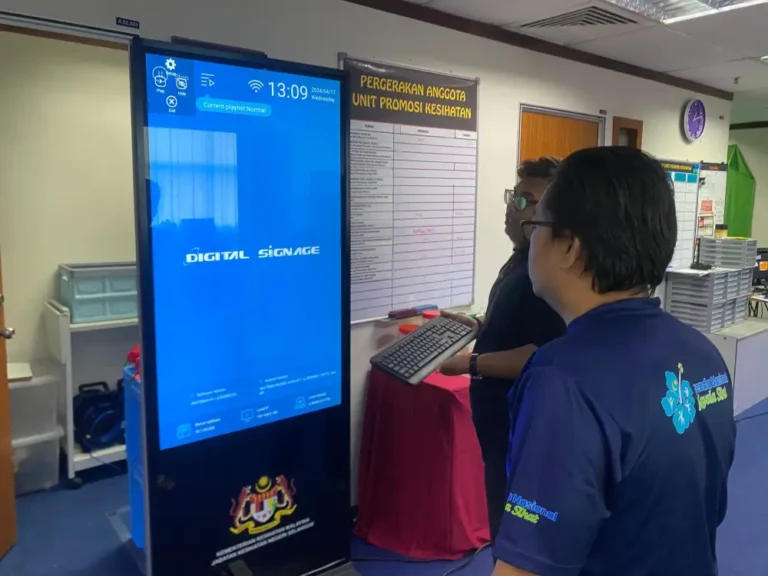Selangor State Health Department has taken a bold leap toward digital transformation by integrating advanced display technology into its operational and outreach activities. The agency recently acquired two units of the FLR103 55-inch interactive kiosk and a powerful 75-inch Smartboard with Android operating system. These new additions to its infrastructure symbolize a progressive move towards improving health education, stakeholder communication, and community engagement through immersive and modern tools.
Interactive Kiosk Solutions for Efficient Public Engagement
The FLR103 interactive kiosks were selected for their clarity, versatility, and reliability. These sleek and robust units serve multiple roles during public health events, internal workshops, and exhibitions. Whether displaying live data, broadcasting health-related PSAs, or navigating informational directories, the interactive kiosks provide an intuitive platform for users to access timely and critical information.
The kiosks are especially effective in high-traffic areas, enabling touch-based browsing of services, upcoming programs, or even digital brochures—reducing the need for physical materials. By adopting such kiosks, the department is streamlining communication and making public health services more accessible and engaging.
Smartboard: Transforming Training and Collaboration
Complementing the kiosks is the department’s acquisition of the Android-based Smartboard ARV200 75-inch model. This smartboard brings an unparalleled layer of interactivity to training, strategy sessions, and health promotion activities. Staff can now interact with multimedia content directly on screen—annotating health statistics, co-creating strategic plans, or hosting live virtual sessions with regional health officers.
Thanks to its Android operating system, the smartboard integrates easily with widely-used applications, digital files, and cloud-based resources. Health officers can run video demonstrations, share real-time updates during briefings, or access centralized health records for a more informed discussion. The smartboard also facilitates hybrid meetings, supporting both in-person and remote collaboration without compromising the quality of the experience.
Bridging Communication Gaps with Digital Engagement
One of the key goals behind this investment is to bridge the communication gap between healthcare professionals and the public. Traditional tools such as posters or leaflets, while still effective, do not resonate as strongly in today’s visually-driven and tech-savvy society. The smartboard and interactive kiosks allow the department to deliver health education in more digestible, interactive formats—be it animations, touch-based quizzes, or data-driven dashboards.
In exhibition settings or public forums, these devices enable real-time interaction, encouraging active learning rather than passive observation. For example, a visitor can browse symptoms of diseases, prevention tips, or even view 3D models of virus structures—all through a tap on the screen.
Improving Training Quality and Staff Development
Internally, the department’s professional development programs are now more engaging and impactful. Trainers can use the smartboard’s built-in tools to create immersive learning modules that include live polls, case simulations, or feedback forms. The real-time capabilities of the board facilitate better retention and collaborative learning among participants, whether it’s for new SOPs, emergency drills, or continuing medical education.
Such upgrades align with Malaysia’s broader vision of digital government services, especially in sectors like healthcare that demand agility, innovation, and robust communication.
Optimizing Resource Use and Embracing Sustainability
In addition to improving communication, the switch to digital smartboards and kiosks contributes to environmental sustainability. Reducing dependency on printed materials and transitioning to digital alternatives significantly lowers paper waste, ink usage, and associated logistics. This approach not only cuts long-term operational costs but also aligns the department with green governance practices that support Malaysia’s environmental goals.
Reinventing Health Promotion in the Digital Era
These tools also open doors to more creative and impactful health campaigns. Using the smartboard, the department can launch campaigns that incorporate real-time Q&A sessions, on-screen demonstrations of proper hygiene practices, or interactive storytelling for younger audiences. Meanwhile, the kiosks can cycle through campaign visuals, videos, or infographics, ensuring continued engagement even during non-peak hours at clinics or community centers.
For rural and underserved areas, mobile units equipped with these tools allow the department to extend consistent, high-quality education and services regardless of location.
A Future-Proof Investment in Public Wellbeing
By adopting these smartboard and interactive kiosk technologies, the Selangor State Health Department sets a new standard for how health communication can be conducted in Malaysia. This investment signals a future-ready mindset—one that prioritizes digital engagement, data-driven communication, and scalable infrastructure.
As public health challenges become increasingly complex, the department’s commitment to innovation ensures that both internal teams and the public are equipped with the tools they need to stay informed, engaged, and proactive.

Image Gallery
About Our Solution
Selangor State Health Department upgraded its infrastructure with two 55-inch FLR103 interactive kiosks and a 75-inch Android smartboard. These tools enhance public engagement, internal training, and community health education through dynamic, interactive digital solutions.

